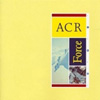A Certain Ratio, "Force"
 This reissue of ACR’s Factory Records swansong captures the band at the height of their popularity and influence, spearheading (along with New Order, Quando Quango, and others) the dancification of the celebrated Manchester indie scene. While inventive, funky, and certainly a proto-Madchester touchstone, it doesn’t hold up quite as well as their Simon Topping-era earlier work (perhaps because dance music evolves a hell of a lot faster than punk). Of course, I am very much predisposed to "tense and brooding" over "funky and fun," so I may not be the target demographic here. Still, I suspect that this is probably the sort of classic album where you had to be there to fully appreciate it.
This reissue of ACR’s Factory Records swansong captures the band at the height of their popularity and influence, spearheading (along with New Order, Quando Quango, and others) the dancification of the celebrated Manchester indie scene. While inventive, funky, and certainly a proto-Madchester touchstone, it doesn’t hold up quite as well as their Simon Topping-era earlier work (perhaps because dance music evolves a hell of a lot faster than punk). Of course, I am very much predisposed to "tense and brooding" over "funky and fun," so I may not be the target demographic here. Still, I suspect that this is probably the sort of classic album where you had to be there to fully appreciate it.
When I listened to Force for the first time, I was reminded of an amusing scene in Until the Light Takes Us in which an exasperated Gylve from Dark Throne patiently explains to an interviewer that he knows exactly how he wants Dark Throne to sound and the fact that he loves underground dance music does not mean that it will wind up on his next album.At this point in their career, A Certain Ratio exemplified the exact opposite of that sentiment—they were a band of post-punk magpies, exuberantly gobbling up and assimilating new influences as fast as they appeared.Whether or not this approach worked for them is pretty contentious, as this album garnered rave reviews from the mainstream British music press (Melody Maker proclaimed it "a glorious achievement") and certainly made a lot of people happy on Manchester’s dancefloors.To my ears, however, it is merely another frustrating step way from their excellent Sextet album.
There are three big problems here.The first is that doing things first is a relative achievement, rather than an absolute one.Being one of the earliest British rock bands to incorporate Latin rhythms, jazz, electro-funk, hip hop, samplers, and NYC dance music into their sound was undeniably fresh and hip in the early ‘80s, but just sounds kind of primitive and dated now.Secondly, the actual songs are not especially great.A lot of effort clearly went into the beats and the arrangements, but the lyrics and vocal melodies are often pretty weak ("C’mon, c’mon, c’mon- get ready!") and it sometimes sounds like vocalist Jez Kerr can’t decide whether he wants to sound like Joy Division or Wang Chung.Finally, the band seems extremely fixated on making sure that the beats are as rib cage rattling as possible.This means that almost all of the songs are mid-paced stomps and that the slapping and popping bass lines are perfectly synced to the drums, rather than being allowed to flow or propel the groove.It’s certainly tight and packs some punch, but also makes the songs sound pretty similar and sacrifices fluidity.I strongly prefer the looser, more laid-back grooves of Force’s predecessor, I’d Like to See You Again.
Nevertheless, A Certain Ratio definitely achieved something here.If Force is a bit of a well-intentioned but clumsy Frankenstein of an album, it’s still a pretty inspired one. Fans of their darker early work will probably only like "Naked and White" (the outro of which boasts some absolutely spectacular drumming), but the band shines brightest on funky instrumentals like the muscular single "Mickey Way" and frequent show-closing Latin dance party "Si Firmo O Grido." Those two vamps have a sense of fun and vitality to them that makes it obvious what the band would rather be doing.Unfortunately, that particular direction was never fully explored, as Force was the last album to feature one of the band’s main creative forces (and strongest musician), as keyboardist Andrew Connell was pulled away by the demands of his more commercially successful Swing Out Sister project.Though the passing of time hasn’t been especially kind to this conflicted and transitional effort, it was nevertheless a very forward-thinking album (in its context) and played a significant role in the evolution of the Manchester sound and dance music in general.Which, of course, is much more than I've been doing lately.
Samples:
 



